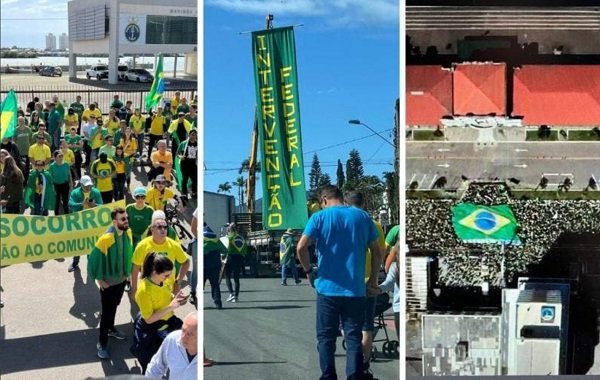This Content Is Only For Subscribers
To unlock this content, subscribe to INTERLIRA Reports.
This Monday (14/11), according to the Federal Highway Police, the protests called against the newly elected President Luiz Inácio Lula da Silva by supporters of the current President, Jair Bolsonaro, who was defeated in the second round of Brazil General Elections, were dispersed in all Brazilian states. However, demonstrators continue in front of military barracks to call for a military coup so that Lula is not inaugurated. For this reason, they have been labeled illegal and antidemocratic by many authorities.
Blockades
Demonstrators are no longer closing points of the roads, but there are at least 54 spots where they are assembled with mobile structures near roads. In addition, in three other locations they are partially blocking road.
Armed Conflict and Turmoil
On Monday (07/11), protesters attacked the Federal Highway Police (PRF) in Novo Progresso (PA) and Rio do Sul (SC), when agents tried to demobilize some of the few blockades that still remain in the country.
In Novo Progresso, located in the southwest of Pará, demonstrators attacked the police with stones and small firearms to prevent the removal of barriers in Km-312 of the BR-163. All the cars used by the PRF were damaged in the action, according to the police. At least three vehicles were pierced by bullets, according to the PRF.
After insisting on blocking the BR-470 on the stretch in Rio do Sul, in the Vale do Itajaí region, in Santa Catarina, protesters attacked PRF agents with metal bars, wooden slats, chairs and other objects. Two officers had minor head and arm injuries.
PRF Under Investigation
The Federal Public Ministry (MPF) is investigating whether there was “political motivation” in the alleged omission and inaction by the Federal Highway Police (PRF) to remove roadblocks promoted by supporters of the current President.
On Thursday (10), at the request of the MPF, the Federal Police started to investigate the PRF General Director Silvinei Vasques. The Federal Police will focus on two topics. The first is Silvinei’s performance on the day of the second round, when the corporation carried out a nationwide operation with checkpoints on federal roads that delayed buses with voters, particularly in the Northeast region of the country, where Lula has a wide margin of votes over Jair Bolsonaro. The second is the work of the PRF against roadblocks and interdictions after the results of the polls.
Sympathy from the Security Forces
The Federal Highway Police (PRF) is investigating at least three cases of irregularities committed by policemen across the country. For instance, in Santa Catarina, the (PRF) put on bureaucratic work – removed from patrol duty – police officers caught in a video saying they would not intervene or fine a group of protesters blocking a federal road. In another case, policemen were filmed drinking coffee with demonstrators.
Other episodes indicating that security forces were sympathizing with the protests were also filmed. In Paraná, while negotiating with the demonstrators, Military Police Colonel Hudson Teixeira stated that he was committing a crime by not carrying out judicial decisions that determined the complete removal of all roadblocks. In exchange for not carrying out severe measures, he asked citizens to only partially block the road, which was also not the orders. Meanwhile, in São Paulo, Military Road Policemen were filmed doing the military salute to protesters.
In Brasília, an Air Force Second Sergeant has seen been collaborating with a camp in front of the Army Headquarters, in Brasília, where protesters are calling for an intervention by the Armed Forces. The political-partisan manifestation of active members of the Armed Forces is prohibited by the Military Statute. The Constitution prohibits active-duty military affiliation to political parties. The rule that governs the category says that any collective manifestations is prohibited.
Businessmen Funding the Protests
On Tuesday (08/11), the general attorneys from the Public Prosecutor’s Offices of São Paulo, Santa Catarina and Espírito Santo met with the Superior Electoral Court (TSE) President Alexandre de Moraes and told him that the acts are funded by businessmen part of “a large criminal organization with predefined functions”. They also said that there is an interstate character in this type of organization because the movements that take place in the different federations are very similar.
The prosecutors have already identified buses belonging to the administration of cities that were used to transport protesters, and trucks belonging to companies that were ordered to remain in the demonstrations to bolster them. More than 70 trucks with the Brazilian flag arrived in the federal capital between Sunday (06/11) and Monday (07). Drivers told journalists that 23 of them left Água Boa (MT) together, in an action organized by businessmen city. A single company, Agritex, contributed with at least 12 trucks. The Grupo Comelli, from Goiás, sent seven trucks. Drivers told newspapers that the initiative that they came to the federal capital by decision of their employers and were instructed to remain in the city until further notice. They also affirmed that the expenses with food, fuel for the trip and transport in Brasilia will be paid by the employers.




